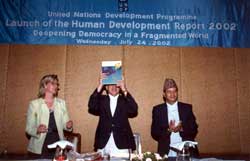 In the midst of our wet and slippery summer of discontent, the United Nations Development Programme brought cherished moments of warmth last week. The good news in the Human Development Report (HDR) 2002 isn't that Nepal's slide into perdition hasn't been as precipitous as we had thought. What's heartening is that we're in good international company.
In the midst of our wet and slippery summer of discontent, the United Nations Development Programme brought cherished moments of warmth last week. The good news in the Human Development Report (HDR) 2002 isn't that Nepal's slide into perdition hasn't been as precipitous as we had thought. What's heartening is that we're in good international company. Of the 81 countries that embraced democracy in the 1980s and 1990s, the report says, only 47 are considered fully free today. With authoritarian leaders manipulating elections and millions of people losing faith in the democratic process, the authors conclude, the hard-won post-Cold War gains risk being reversed. In scores of nations, political opposition, free press and citizens groups are either non-existent or on their way to becoming so.

The study, Deepening Democracy in a Fragmented World, also found that economic slowdowns in many countries add to the popular perception that democracies cannot deliver better lives. Banks, courts and government institutions are under strain, often because of corruption or political pressures. Electoral processes are subverted by fraud and iron-hand politics. The authors maintain that barriers to trade, along with production and export subsidies in rich countries, cost the developing world more in lost exports than the $56 billion they receive in aid each year. Nevertheless, the principal stimulus for democracy and development must come from within countries. The international community can encourage the process, but not impose it.
You might wonder whether Nepalis needed an exhaustive international report to learn what we've been living through. It's the messenger, not the message, that counts here. Those of you who were so worked up by the dressing down we got at the Nepal Development Forum and London conference can cheer up. It doesn't look like the governments of Burundi and Burkina Faso have avoided similar admonitions.
The HDR-2002 authors affirm the traditional tenet that democracies are less prone to civil war than non-democratic regimes and are more likely to cope with political turmoil. Before you retort how Nepal is an exception on both counts, you must acknowledge that the authors are speaking in general terms about 140 countries that hold multiparty elections. The redeeming value of the report lies in our ailing body politic. Or, more precisely, their custodians. When the lead international donor seeks the consent of upper and lower riparian countries as part of the process of setting up a hydro-power development fund, our politicians are castigated for having sold off our sovereignty not even for a pittance. When development agencies funding grass-roots projects warn of suspending programmes if the local bodies remain vacant for too long, the people easily transform despair into deeper antipathy to the political class. Leaders struggling to allocate dwindling resources to unlimited national needs find themselves neck-deep in criticism for having allowed Nepal's per capita income to slide from $240 to $224 within a single fiscal year. (Actually, things aren't as bad as they sound; 63 countries have lower per capita incomes than what they did 12 years ago.)
Although they were buried in the sixth or seventh paragraph in most newspapers, our politicians can take heart from remarks UNDP chief Mark Malloch Brown's made at a media briefing in New York. Exacerbating the people's disenchantment in developing nations is a growing sense that their elected governments have little power over the world bodies that set the rules for their economies. Working translation: The next time we feel like spewing out our fire and fury, we should seriously consider letting the World Bank, International Monetary Fund and World Trade Organisation take some of the heat.
For an organisation that just two years ago brought out an HDR hailing the spread of democracy across Latin America, Central and Eastern Europe, and parts of Africa and Asia, the UNDP couldn't have missed the post-9/11 trepidation. With Cold War-style military alliances having returned to the centre of international strategic calculations, could the corollary-the sacrifice of human rights for national security-be far away? Sakiko Fukuda-Parr, HDR-2002's chief author, seeks to demolish the emerging wisdom that fostering democracy might endanger world security. "History and academic research provide no evidence that authoritarian regimes are better at promoting economic and social progress." Ordinarily, such a bold assertion would have been sufficient to discourage any kind of adventurism from the extremes. In today's freak political climate, it could embolden our agents of authoritarianism to have another try.


